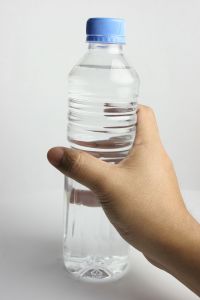
We’re mostly water. Water is essential to people, both for drinking and for cleaning. As the winter approaches it is good to be prepared with extra supplies in our home and at work.
While you only need to drink 2 quarts of water per day, we often forget about the water that we use for cleaning ourselves, washing our hands, and cleaning our pots and pans. Even in an emergency you still need to keep clean. This is why emergency preparation organizations recommend that you store a gallon of water per person per day. Store at least a 3 day supply of water.
You can buy water from the grocery store and write the date on the cap with a permanent marker. However, if your budget is a concern, water does not need to be expensive. You can clean any food-grade plastic container with a very dilute bleach solution, then wash it clean again. Fill it with water and screw on the cap. Plastic milk jugs tend to get brittle, so avoid using these. Pop bottles work well.
Should you store water in plastic or glass? Although I am as concerned about the gradual leaching of plastics as the next person, I also want to make sure that my water supply is intact, even if something falls on it. For this reason, I choose plastic bottles.
Where should you store this water?
Store a supply of water inside your home for those times of the year when there is a boil water advisory, especially if you have elderly or immune-compromised individuals in your house. I can boil water, but it takes some time. If you lack space, store the water under a bed.
Store the bulk of your emergency supplies in a sheltered, cool and dry outdoor location, far enough away from buildings that you would be safe accessing the supplies. If animals are a concern, store the supplies in a locked plastic or wooden bin.
If you’re in an apartment building, see if you can get your apartment council to create an area for emergency storage hidden outside an entrance or exit. You can also store emergency supplies at work if you are at work all day, and keep a backpack handy so that you can carry a small supply of water when you head home.
Image Credit: nazreth

